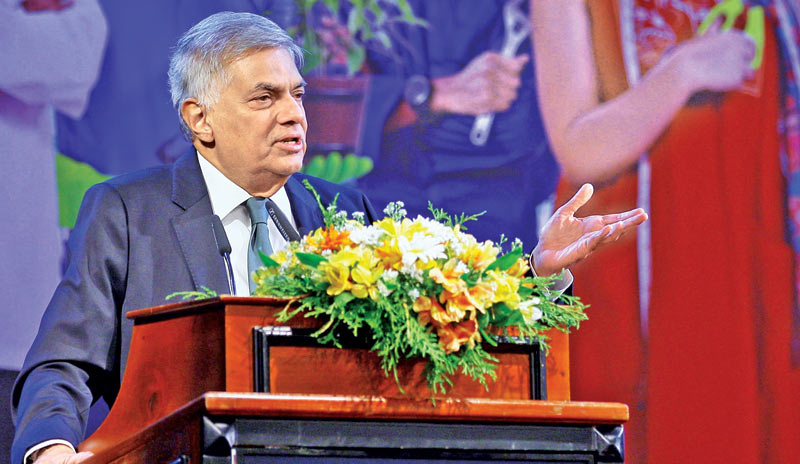Since developed countries have formulated their education system to suit modern-day society, Sri Lanka too will be modern through a revolution in its education system, Prime Minister Ranil Wickremesinghe said.
“By making 13 years of school education mandatory, employment and income avenues will be created to suit the modern-day economy,” the Prime Minister said.
The Premier was addressing the gathering at a ceremony at Temple Trees to initiate the programme instituted by the government to ensure that each child receives 13 years of guaranteed education yesterday.
The ultimate goal of the programme is enabling the next generation to contribute meaningfully to the Sri Lankan economy by developing the technical, vocational and social skills of each child.
The Prime Minister said during the time of the Sinhala kings our main economic resource was paddy cultivation in the dry zone.
“Thereafter, it changed to spices including cinnamon, but today agricultural products and the garment and fishing industries were not the prime economic resources. Our main resource was the manpower resource and the country’s central location in the Indian Ocean,” Prime Minister Wickremesinghe said.
“For any country to achieve development, it should have a developed human resource. Countries which had a high education system achieved development. Land-locked countries like Czechoslovakia and Hungary have developed their railways and other services up to the standard of China.”
“Knowledge was the most important factor in the world today. It was knowledge which had made the USA the most powerful and leading country in the world,” the Premier said.
“We talked about our free education and somehow continued it up to the GCE Ordinary Level. After Ordinary Level, only 50 to 55 percent of students in that age limit remained for higher education. Certain others give up education after failing the 8th Grade, while another group dropped out after the GCE Ordinary Level. From the 50 percent who moved forward, only about five percent gained eligibility to enter university, while another 10-15 percent entered other higher education institutions,” he said.
This resulted in wastage of human resources. The present education system was created during colonial times to admit students to universities. But today, developed countries had fashioned their systems of education to train students to suit modern-day society. They should be given not only university knowledge, but also social knowledge, the Prime Minister said.
“It is this revolution which we are launching in education today. Free education began in Sri Lanka in the 1940s and our system of education was of a high standard then. But today, countries like Korea, Japan, China, Thailand, Malaysia and Singapore had started the 13-year mandatory education system. We are starting this system for the 50 percent of students who drop out from school education after the Ordinary Level,” he said.
Initially, necessary aid was provided to schools in this regard. Thereafter, the ‘Nearest School is the Best School’ system was started under the leadership of Minister Akila Viraj Kariyawasam. Then the Suraksha Insurance scheme for students was introduced. All this was done to create the background and lay the foundation for the 13-year mandatory education programme. Our main objective was to provide higher education for all,” the Premier said.
“As well as professors, good sportsman and women were needed to develop a country’s society. Without being content with having professors or the best universities, we should entertain expectations of winning Test matches as well as 20-20 matches.”
“The deterioration of universities is a problem like the inability to win cricket matches. The country needed about three lakhs of people with technical knowledge and graduates. But today, we had only about 100,000 of them,” he said. “If the services of this 300,000 could be obtained, the country could overcome the debt burden and earn another Rs. 2,000 million to Rs. 3,000 million.”
When knowledge in the agriculture sector improved, production also improved, resulting in competition and reduction of prices. Likewise, knowledge was needed for all sectors. That was why the government introduced this novel programme, the Prime Minister said.



Add new comment